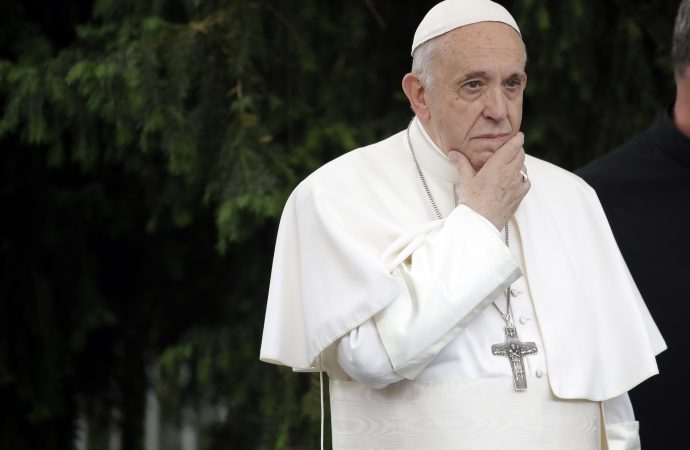In the wake of an April 30 open letter accusing Pope Francis of heresy signed by 19 clergymen and scholars, demanding the pontiff’s resignation, theologians and cardinals at a conference in Rome on Wednesday instead praised Francis’s theology and magisterium.
“Pope Francis is the pope, and when he speaks it’s magisterium,” Italian Cardinal Lorenzo Baldisseri, general secretary of the Synod of Bishops, told Crux after the event.
The symposium, called “Theology and Magisterium in the Church with Pope Francis,” took place May 8 in Rome at the Pontifical Gregorian University to present a new collection of books titled The Theological Seeds of Francis.
The series of 11 books touches on some of the recurring themes, or “seeds”, present throughout Pope Francis’ pontificate from discernment and reform to neo-gnosticim and integration.
Nineteen conservative critics of Pope Francis released an open letter May 1 accusing the pontiff of committing heresy and calling on the world’s bishops to censure him and - if necessary - to declare that he is no longer pope.
In a message to the event, Italian Cardinal Gualtiero Bassetti, President of the Italian Episcopal Conference, looked at how Francis’ documents and speeches depict a renewed path for theologians that rooted in reality.
“The ease with which the texts and documents of Pope Francis can be read must not fool people or lead them to hurried conclusions,” he said.
“His thought is not at all improvised, but the fruit of a deep and lively theological reflection drawn from his experience as a pastor and theologian.”
According to Father Maurizio Gronchi, professor of Christology at the Urbaniana Pontifical University, the impact of Francis’ style could be compared to the 13th century introduction in Italy of the Dolce Stil Nuovoliterary style, due to its poetic and emotional charge.
“Francis’s approach is elliptic, and gravitates around two permanent hearts, the heart of man and the heart of the gospel,” Gronchi said.
Citing Francis’ March speech to theologians at the Pontifical Lateran University in Rome, Bassetti said the pope is trying to “teach theologians a style” that draws them away from their ivory towers and into real life.
“I know that one can study by closing himself in academic circles with no air, playing with concepts rather than interpreting life, clutching to formulas but distancing oneself from the real existence of people,” Pope Francis said at the March 26 event calling for “a radical paradigm change” and “a brave cultural revolution.”
According to Bassetti, Pope Francis’ apostolic exhortation on the environment Laudato Si is an example of his pragmatic and concrete approach.
“The pope exhorts and invites theologians humbly but with force to take their duty seriously and begin that journey that Pope Francis himself has already begun,” he said.
The Italian prelate also emphasized the strong connection between the magisterium of Pope Francis and the theological heritage of the Second Vatican Council. Theologians speaking at the symposium agreed that this connection is crucial to understand this pontificate.
“In this moment, the fundamental thoughts of the Second Vatican Council have a chance of to take hold like never before,” said Dario Vitali, director of the Department of Dogmatic Theology at the Gregorian.
While cautioning against those who would like to see in Pope Francis a theologian, Vitali said that his magisterium contains “theological informarions.”
“Some dare to treat this magisterium as if it were an opinion,” he said, pointing the finger at economic and traditionalist lobbies.
Pierangelo Sequeri, one of the curators of the new books and Director of the Pontifical Theological Institute John Paul II, also criticized those who vocally oppose Francis’ pontificate during his speech.
“Those who always repeat the same old song don’t honor the revelation,” he said making an analogy with music, “but those who think that everything you play is music, are greatly mistaken.”
According to Sequeri there is a need for a better formation of theologians capable of interpreting and deepening the knowledge of the Gospel and the understanding of the Catholic faith.
“The world of ecclesiastic chatter is inhabited by weak nobodies who act as if they are Pope Gregory the Great, Thomas Aquinas and Bonaventura,” he added.
Theologians are called to bring new life and enthusiasm to the Church, he continued, which has become “excessively melancholic” and therefore prone to aggression and polarization.

